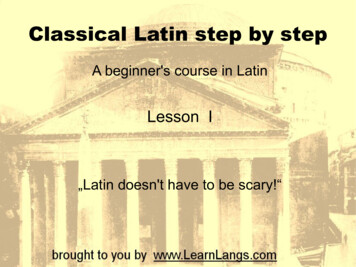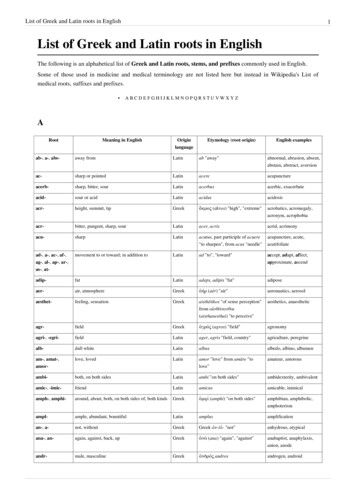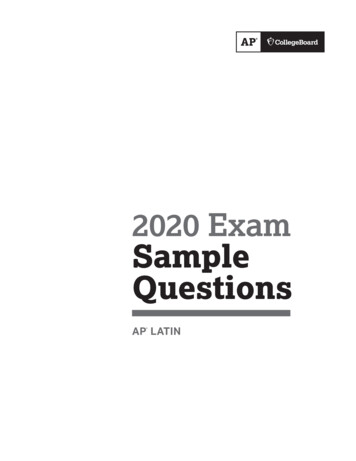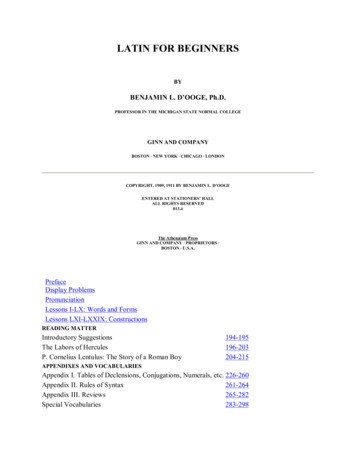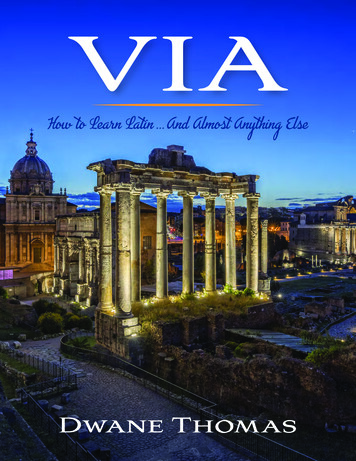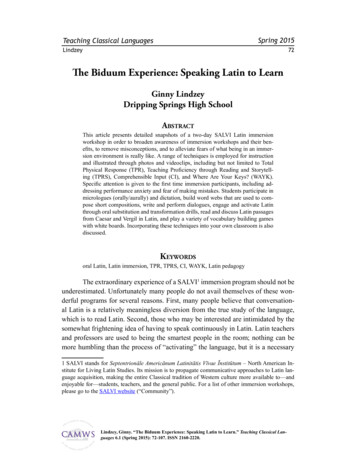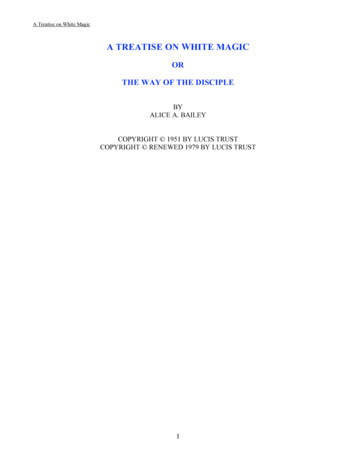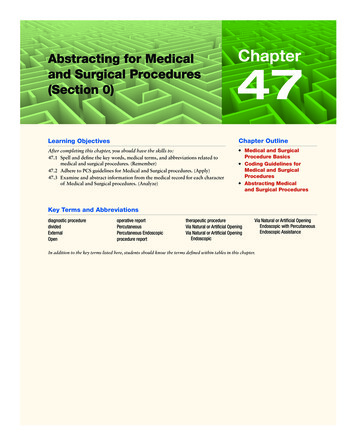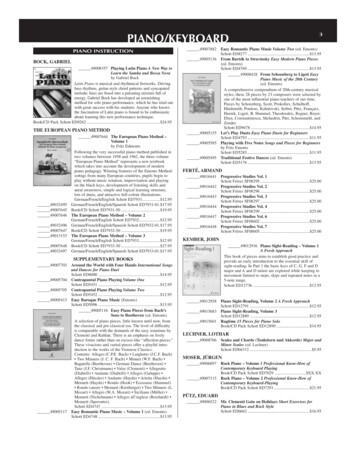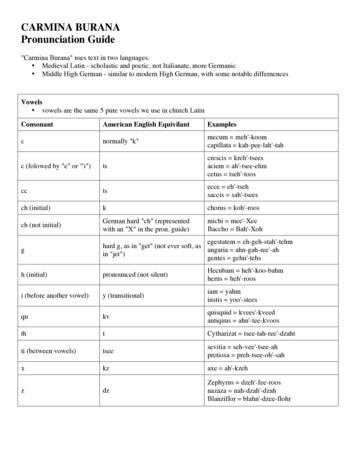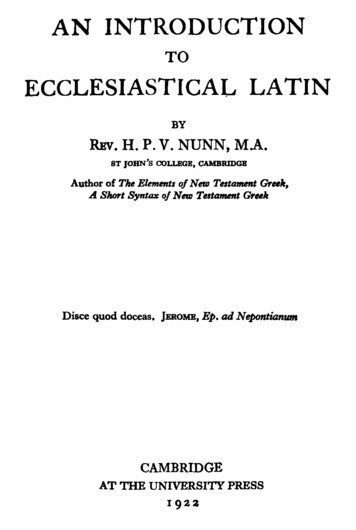
Transcription
A N INTRODUCTIONTOECCLESIASTICAL LATINBYREV. H . P . V . N U N N , M A .S T JOHN'S COLLEGE, CAMBRIDGEAuthor of The Elements of New Testament Greek,A Short Syntax of New Testament GreekDisce quod doceas.JEROME,Ep. ad NepontiamtmCAMBRIDGEAT THE UNIVERSITY PRESS1922
Biblio!èque Saint Libèrehttp://www.liberius.net Bibliothèque Saint Libère 2008.Free to reproduce for any non-profit purpose.
ANINTRODUCTIONTO ECCLESIASTICALLATIN
Sola Scripturarum ars est, quam sibi passim vindicant:Scribimus indocti doctique poemata passim.H a n c garrula anus, hanc delirus senex, hanc sophista verbosus, hanc universi praesumunt, lacerant, docent, antequam discant. Alii, adducto supercilio, grandia verba trutinantes, inter mulierculas de sacris Uteris philosophantur.Taceo de mei similibus, qui, si forte ad Scripturas sanctaspost saeculares literas venerint, et sermone composito aurempopuli mulserint, quidquid dixerint hoc legem Dei putant,nec scire dignantur quid prophetae, quid apostoli senserint:sed ad sensum suum incongrua aptant t e s t i m o n i a . . . .Puerilia sunt haec et circulatoTum ludo similia, docere quodignores, imo, u t cum stomacho loquar, ne hoc quidem scirequod nescias.Noli offendaris in Scripturis Sanctis simplicitate et quasi vilitate verborum, quae vel vitio interpretum, vel de industria"sic prolata sunt, u t rusticam concionem facilius instruerent,et in u n a eademque sententia aliter doctus, aliter audiretindoctus.Jerome, E p . 5 3 .*****Saepe e t verba non latina dico u t intelligatis.Augustine in Ps. 1 2 3 .*****Melius est reprehendant nos grammatici, quam non intelligant populi.Augustine in Ps. 1 3 8 .
CAMBRIDGE UNIVERSITYPRESSC . F , C L A Y , MANAGERLONDON: F E T T E R L A N E , E.G. 4N E W YORK : T H E M A C M I L L A N C O .BOMBAY]CALCUTTA } - M A C M I L L A N A N D C O . , L T D .MADRAS JTORONTO : T H E M A C M I L L A NCO.OF CANADA, LTD.TOKYO iMARUZEN-KABUSHIKI-KAISHAALL RIGHTS RESERVED
MEMORIAEMATRIS DILECTISSIMAEIN CHRISTO DORMIENTISDEDICATUM
CONTENTSPAGETHEORIGINA N D CHARACTERO F MOOD.TENSE.3435VOICE43T H E I M P E R A T I V E MOOD: T H E S U B J U N C T I V EINPRINCIPALCLAUSES.MOOD.NOUN CLAUSES:THE DISTINCTION4346B E T W E E N D I F F E R E N T SENSES O F T H ES A M E WORD46T H E INFINITIVE MOOD A N D I T S E Q U I V A L E N T S48T H E INFINITIVE O R I T S E Q U I V A L E N T S U S E D A S T H E S U B J E C T ORCOMPLEMENT OFA V E R BTHEINFINITIVE O R I T S E Q U I V A L E N T S54USEDTO COM P L E T E T H EMEANING OFCERTAIN V E R B ST H E INFINITIVE O R I T S E Q U I V A L E N T S. USED A S T H E OB JECT OFA VERBDEPENDENT S T A T E M E N T S5960.6 1DEPENDENT C O M M A N D S66DEPENDENT Q U E S T I O N S68NOUN C L A U S E S I N A P P O S I T I O NTO A NOUN OR PRONOUN69ADJECTIVAL CLAUSES71ADVERBIAL74CLAUSESCLAUSES O F T I M E74CLAUSES O F P L A C E77CLAUSES O F C A U S E78CLAUSES O F P U R P O S E79
viiiContentsPAGEA D V E R B I A L C L A U S E S (cont.)CLAUSES O F C O N S E Q U E N C E81CLAUSES O F C O N C E S S I O N82CLAUSES O F C O N D I T I O N83CLAUSES O F C O M P A R I S O N87PARTICIPLESGERUND,88GERUNDIVEA N D SUPINE .92QUESTIONS97ADJECTIVES98PREPOSITIONS100EXTRACTS FROM ECCLESIASTICAL WRITERSPERPETUA: VISIONESCYPRIAN:114J E S U S CHRISTUS P A T I E N T I A E E X E M P L A R.117QUID E S T V O L U N T A S D E I ?119Q U A R E JUSTUS CUM CHRISTO E S S E DESIDERAT .119DE DEFECTU FIDEI IN TRIBULATIONE.120.121.123QUODFiLii.D E I PATRI S I M I L E S E S S E D E B E N TAMBROSE:D E J U D I C I O DOMINI I N ARIANOS.JEROME:SOMNIUM HIERONYMI126DE VITA CLERICORUM127A U G U S T I N E : D E M I S E R I I S AUGUSTINI I N P U E R I T I AORATIO P R O MONNICA M A T R E S U ABEDE:D E V I T A B E A T I P A P A E GREGORIIDEADVENTUAUGUSTINIAD.132. 1 3 4,.PRAEDICANDUMG E N T I ANGLORUMDECOLLOQUIOBRITTONUMADAMNAN: D EVITA139AUGUSTINI.E T TRANSITU.CUM.EPISCOPIS, .144DEBONOFIDEI149D E F R U C T I B U S INCARNATIONISQUARE142A D DOMINUM SANCTICOLUMBAETHOMAS AQUINAS :136ORAREDEBEMUSVOLUNTAS DEI.MVT.152FIAT.153THOMAS A K E M P I S : QUALITER H O M O D E S O L A T U S S E D E B E TIN MANUS DEI OFFERREINDEX O FTEXTS QUOTED.154157
PREFACETH I S book is written to meet the needs of a special class ofstudents, namely of those t h a t desire to study EcclesiasticalLatin.Ecclesiastical Latin may be denned as the form which the Latinlanguage assumed in the hands of the Fathers of t h e WesternChurch and of their successors up t o the time of the revival oflearning.The book is divided into two parts: first, a summary of suchsyntactical rules as are necessary for t h e understanding of t h eworks of these writers, with an explanation of the points in whichEcclesiastical Latin differs from Classical Latin: secondly, a selec tion of passages taken from the works of some of t h e principalauthors of the period with notes drawing the attention of thestudent t o the appropriate sections of the syntax.T h e syntax has been treated on broad lines, and n o a t t e m p t h a sbeen made to trace all the peculiarities of t h e countless writers ofEcclesiastical Latin who represent so m a n y different countries anddegrees of culture.The examples are taken as far as possible from the Vulgate NewTestament, because this is the most readily accessible book be longing t o t h e period.I t must not be assumed from the fact t h a t the examples aretaken from this source t h a t the Vulgate is t o be regarded as typicalof Ecclesiastical Latin.I t is a translation, and often a very literal translation, of aHebrew or Greek original. The Vulgate is not a Latin Classic int h e sense t h a t t h e Authorised Version of t h e Bible is a n EnglishClassic.I t will however be found t h a t most of the constructions t h a tcommonly occur .in Ecclesiastical Latin are to be found in theVulgate, and, generally speaking, examples have been given ofthese constructions only. A very slight a t t e m p t has been madet o deal with t h e great variety of curious distortions of Latin whichthe translators made use of in the a t t e m p t to represent literallyobscure passages in the Hebrew.
XPrefaceThose who intend t o use this book should possess a t t h e leasta knowledge of t h e conjugations of Latin verbs .and t h e declen sions of Latin nouns such as m a y be got from any primer .They should begin with t h e Vulgate New Testament whichcan b e procured in t h e revised text of Wordsworth and Whitefrom t h e Bible Society. A brief dictionary of the Vulgate NewTestament b y D r Harden h a s recently been published b y t h eS.P.C.K.From this they m a y pass on t o t h e study of t h e easier Fathers,such as Cyprian, or t o the Latin Hymns.Unfortunately there are n o t many editions of t h e Latin Fathersreadily accessible t o English readers. T h e only collection of cheaptexts is found in t h e series "Opuscula SS. P a t r u m , " edited b yH. Hurter a t Innsbruck. The S.P.C.K. " T e x t s for S t u d e n t s " seriescontain some Latin texts.The author intends shortly t o publish a collection of LatinHymns. A t present the only one available is t h e " Hymni Latini,"published b y Clowes.I t is hoped t h a t the book m a y be of use t o ordination candidates;b u t there is also another class of student t h a t the author had inmind when writing it, namely those who either begin the study ofLatin after they leave school, or who wish t o continue their studyfor t h e purpose of improving their education.I t is t o be feared t h a t not many persons carry away enough Latinwith t h e m from school t o enable t h e m t o read t h e Classical authorswith a n y readiness; t o such persons who wish t o improve theirknowledge of the language b y private study t h e author offers t h efollowing suggestions.John Locke stated t h a t in his opinion t h e best way for a n adultt o learn Latin was b y reading t h e Latin Bible, and so great alinguistic genius as Lord Macaulay did n o t disdain t o learn Germanfrom a German Bible. The author feels confident from experiencet h a t those who begin with t h e Latin Bible and t h e easier Eccle siastical authors will b e able t o go on t o t h e study of t h e Classics,if they desire to do so, with far more intelligence and profit t h a nif they had tried t o approach them without some previous pre paration. H e believes that, in t h e general absence of a n y oppor tunity of hearing spoken Latin and speaking the language oneself,11For beginners the author recommends Latin for Beginners, by BenjaminL. Dooge. Ginn and Co. Gradatim, by Heatley and Kingdon, is also useful.
Prefacexithe next best course is t o read as much as possible of such authorsas are most easily understood .The Gospels in t h e Vulgate are very simple and easy t o under stand, and t h e same simplicity of style is also found in some of t h eearly Ecclesiastical writers and in m a n y mediaeval writers, especi ally in t h e Hymns and Liturgies.Speaking generally there is a directness and absence of arti ficiality about t h e Ecclesiastical writers which makes their worksmore easily intelligible than most of those of t h e Classical writers,except Caesar, and they have t h e advantage over his works int h a t they contain n o long passages in "Oratio Obliqua."Much of Classical Latin is highly artificial, not t o say unnatural,in its modes of expression. The authors whose works are mostgenerally read wrote for a fastidious and highly cultivated societyof litterateurs who, in most cases, thought far more of style t h a n ofmatter. Their subject-matter was often borrowed from t h e Greek;they wrote rather t o please than t o instruct; and, especially underthe early Empire, they wrote with a view t o reading their works t oadmiring circles of friends, whose applause they hoped t o arouseby some novel or far-fetched turn of expression. All ClassicalLatin literature, except the very best, is vitiated by rhetoric, andby the desire t o say old things in a new way.The Christian authors, on t h e other hand, although most ofthem h a d been trained in t h e rhetorical schools, and although theirwritings show many traces of their training, were a t least men in11The author is pleased tofindthat his opinion in this matter is confirmed bythe high authority of the late Dr J . H. Moulton in the parallel case of an adultwho wishes to learn Greek.Dr Moulton considers that this study may be most easily approached bythe way of N.T. and Hellenistic Greek, which, in Latin, is paralleled by theVulgate and the Ecclesiastical writers.Dr Moul ton's words are as follows:" Men who have had no educational advantages, called to the work (of theministry) after many years away from school—how shall we best train them forservice in which experience shows they may be surpassingly useful?. Perhapsthe writer may contribute his experience of some years. Hellenistic Greekproves a far shorter road than the Classical grammar which the writer used inhis schoolmaster days. A short and simple grammar and reader in New Testa ment Greek, written for the purpose, supplies the forms and syntax neededfor intelligent reading of the sacred text; and with this basis it is found thatstudents with an aptitude for languages can go on to Classical Greek whenthey have become proficient in the far easier Hellenistic." J . H. Moulton inCamb. Biblical Essays.
Prefacedeadly earnest. They did not write to amuse the leisure of theirfriends: those of the first three centuries wrote with the fear ofdeath always hanging over them to men who needed help andguidance in the face of the same terror: those belonging t o the ageafter the triumph of the Church wrote of things which they heldto be of eternal and sovereign importance both to themselves andto those who should read their books. This, generally speaking,gives their writings a simplicity and directness which greatlyfacilitates the progress of the learner.Even the Latin of the middle ages, although it is certainly notCiceronian, and would not have passed current even with Jerome,yet is a wonderfully forcible and pregnant form of speech a t itsbest.I t is foolish to condemn and neglect a whole period of literature,because the style in which it is written does not come up to a purelyartificial and arbitrary literary standard.I t is not necessary to deny the great excellence of the Latin ofthe Augustan age, and of Cicero in particular, in order to see meritsin the Latin of other periods. We m a y heartily agree t h a t theLatin of the Golden Age is supreme and unapproachable. Wemay all wish to write like Cicero and do our best to imitatehim; but this is no reason why we should refuse to see any meritin writers who, carried on by the natural development of t h elanguage, and by the strange and novel ideas which they wereconstrained t o express, wrote in a different style, and with adifferent vocabulary.There is no more reason for setting u p the writers of the Augustanage as models of style, and labelling all t h a t does not conform totheir standard as decadent or barbarous, than there would be for,setting up Dryden, Pope and Johnson as the only correct writersof English. No language in which it is still possible for an authorto express his thoughts with precision and clearness can justly becalled decadent or barbarous, even though it does not conform toa given standard; and it is by this test, rather than by approxima tion t o any "Classical" style, t h a t t h e later authors should bejudged.Although, as has been said, much of the work of t h e earlierEcclesiastical authors is vitiated by the rhetorical devices commonto the period in which they lived, and although many of the laterauthors are barbarous enough; yet, with few exceptions, all the
Prefacebest known writings of Ecclesiastical authors of t h e first rank areworth studying in t h e original.There are very few books accessible on this subject. The followinghave been consulted:GOELZER. L a Latinite
to learn Lati wans b readiny g the Latin Bible an,d s greao t a linguistic genius as Lord Macaulay did not disdain to learn German from a German Bible Th. e author feels confident from experience that thos whe o begin with the Latin Bibl ane d the easier Eccle siastical authors wil ble able to go on to the study of the Classics, if they desir toe do so, with far more intelligenc aned profit .
